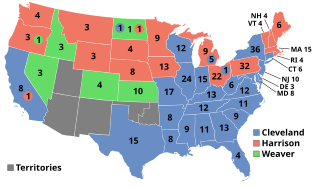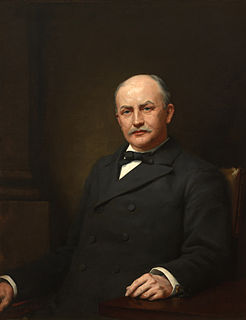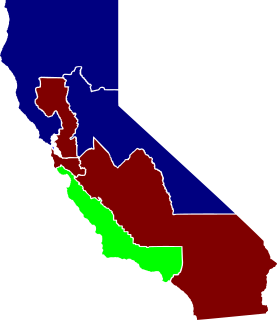
The United States presidential election of 1892 was the 27th quadrennial presidential election, held on Tuesday, November 8, 1892. In a re-match of the closely contested 1888 presidential election, former Democratic President Grover Cleveland defeated incumbent Republican President Benjamin Harrison. Cleveland's victory made him the first and to date only person in American history to be elected to a non-consecutive second presidential term. It was also the first of two times that an incumbent was defeated in two consecutive elections.

The Homestead strike, also known as the Homestead Steel strike, Pinkerton rebellion, or Homestead massacre, was an industrial lockout and strike which began on July 1, 1892, culminating in a battle between strikers and private security agents on July 6, 1892. The battle was one of the most violent disputes in U.S. labor history, third behind the Ludlow Massacre and the Battle of Blair Mountain. The dispute occurred at the Homestead Steel Works in the Pittsburgh area town of Homestead, Pennsylvania, between the Amalgamated Association of Iron and Steel Workers and the Carnegie Steel Company. The final result was a major defeat for the union of strikers and a setback for their efforts to unionize steelworkers.

The 1892 United Kingdom general election was held from 4 July to 26 July 1892. It saw the Conservatives, led by Lord Salisbury, win the greatest number of seats, but not enough for an overall majority as William Ewart Gladstone's Liberals won many more seats than in the 1886 general election. The Liberal Unionists who had previously supported the Conservative government saw their vote and seat numbers go down.
The Football League Second Division was the second level division in the English football league system between 1892 and 1992. Following the foundation of the FA Premier League, it became the third level division. Following the creation of the Football League Championship in 2004–05 it was re-branded as Football League One.

Elections to the United States House of Representatives were held in 1892 for members of the 53rd Congress, taking place at the same time as the election of Grover Cleveland as President for the second, non-continuous, time, defeating incumbent Benjamin Harrison.

Pyraustinae is a large subfamily of the lepidopteran family Crambidae, the crambid snout moths. It currently includes over 1,400 species, the majority of them tropical but some found in temperate regions including both North America and Europe.

Spilomelinae is a very large subfamily of the lepidopteran family Crambidae, the crambid snout moths. They were formerly included in the Pyraustinae as tribe Spilomelini; furthermore taxonomists' opinions differ as to the correct placement of the Crambidae, some authorities treating them as a subfamily (Crambinae) of the family Pyralidae. If this is done, Spilomelinae is usually treated as a separate subfamily within Pyralidae. The Spilomelinae are believed to be polyphyletic. Many genera are only tentatively placed here even at this point.

The United States House of Representatives elections in California, 1892 was an election for California's delegation to the United States House of Representatives, which occurred as part of the general election of the House of Representatives on November 8, 1892. California gained one seat as a result of the 1890 Census, which was won by the Populist Party. Democrats also picked up an open Republican seat.

Hampont is a commune in the Moselle department in Grand Est in north-eastern France.

Tarantulas comprise a group of large and often hairy arachnids belonging to the Theraphosidae family of spiders, of which about 900 species have been identified. This article only describes members of the Theraphosidae, although some other members of the same infraorder (Mygalomorphae) are commonly referred to as "tarantulas". Some species have become popular in the exotic pet trade. New World species kept as pets have urticating hairs that can cause irritation to the skin and, in extreme cases, cause damage to eyes.

The 1892 United States presidential election in California refers to how California participated in the 1892 United States presidential election. California voted for the Democratic challenger, former president Grover Cleveland, over the Republican incumbent, Benjamin Harrison by an extremely narrow margin of just 147 votes, or a 0.05452% margin, which constitutes the fifth-closest statewide presidential election result on record, behind Florida in 2000, Maryland in 1832 and 1904, and California itself 20 years later in 1912. One faithless elector cast a vote for Harrison.

The 1892 New York state election was held on November 8, 1892, to elect the Chief Judge of the New York Court of Appeals, as well as all members of the New York State Assembly. Besides, three amendments to the State Constitution were proposed: to transfer the settlement of contested elections to the courts, to authorize the sale of the state-owned salt works at Salina, New York, and to increase the number of New York Supreme Court justices by ten.
The United States Senate elections of 1892 and 1893 were elections which, corresponding with former Democratic President Grover Cleveland's return to power, had the Republican Party lose nine seats in the United States Senate and lose its majority to the Democratic Party. The Democratic majority, however, was minimal and didn't last past the next Congress.

The 1892 United States presidential election in Pennsylvania took place on November 8, 1892, as part of the 1892 United States presidential election. Voters chose 32 representatives, or electors to the Electoral College, who voted for president and vice president.

The 1892 United States elections was held on November 8, electing member to the 53rd United States Congress, taking place during the Third Party System. Democrats retained the House and won control of the Presidency and the Senate. Following the election, Democrats controlled the Presidency and a majority in both chambers of Congress for the first time since the 1858 elections.
Philip Dearman Mennell, was an English-born encyclopedist, journalist and newspaper owner, active in Australia, author of the Dictionary of Australasian Biography (1892).

The 1892 United States presidential election in Virginia took place on November 8, 1892, as part of the 1892 United States presidential election. Voters chose twelve representatives, or electors to the Electoral College, who voted for president and vice president.
Elections to Liverpool City Council were held on Tuesday 1 November 1892. One third of the council seats were up for election, the term of office of each councillor being three years.
Elections to Liverpool City Council were held on Monday 2 November 1891. One third of the council seats were up for election, the term of office of each councillor being three years.

The 1892 United States presidential election in Massachusetts took place on November 8, 1892, as part of the 1892 United States presidential election. Voters chose 15 representatives, or electors to the Electoral College, who voted for president and vice president.

















